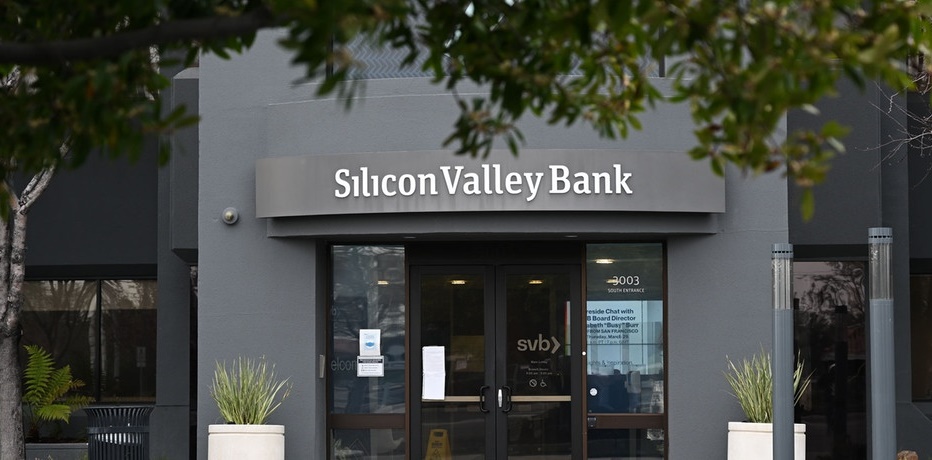How dangerous is the SVB collapse?
The collapse of the US Silicon Valley Bank is causing unrest worldwide, and fears of a domino effect are rampant in the financial sector. The most important answers to current questions.

It is the biggest bank collapse since the financial crisis of 2008: The Silicon Valley Bank (SVB) collapsed in the USA. In addition, the New York Signature Bank will also be wound up.
Why did the SVB get into trouble?
The Silicon Valley Bank was one of the most important money houses for start-up financing in the USA. The start-ups had parked large deposits with the bank in recent years, but now had to liquidate them faster than expected in view of the rising interest rates in the USA.
In order to be able to continue to provide customers with money, the bank wanted to collect liquid funds through an emergency capital increase. But that failed, and stocks posted a record daily loss on Wall Street on Thursday. This wiped out stock market values of around 80 billion dollars. After a price slide, the shares were suspended from trading on Friday and the bank was placed under state control.
Why was Signature Bank closed?
The US authorities also closed Signature Bank in New York on Sunday. The bank was the only remaining bank with large crypto businesses after Silvergate Capital went bust last week, citing miners, crypto exchanges and other industry firms among its clients.
What happens to the savings deposits?
The US deposit insurance fund, FDIC, transferred all deposits from the collapsed SVB to a newly formed bridge bank. The bank manager Tim Mayopoulos was appointed CEO of the institute, as the FDIC announced.
The US government had promised in advance that all deposits should be protected. Customers should be able to access all of their money.
How dangerous is the current crisis?
The International Monetary Fund (IMF) said it is monitoring the possible impact of the Silicon Valley bankruptcy on financial stability. “We have every confidence that US policymakers will take appropriate action to get the situation under control,” said an IMF spokesman.
So far, however, there are no signs that the crisis could spread: “The SVB does not endanger the international capital market. Its cluster risk from start-up financing is atypical for the banking sector,” said the President of the Bavarian Financial Center, Wolfgang Gerke.
The Federal Reserve presented a new program to support the banks on Sunday: The “Bank Term Funding Program” provides additional funds. Up to $25 billion from the Treasury Department’s Currency Stabilization Fund will back the Fed’s lending program.
How big is the risk for European banks?
In France, the crisis is viewed calmly – according to French Finance Minister Bruno Le Maire, the collapse does not pose a risk to the French banking system. “We are monitoring the situation in the USA, but there is no specific alarm for the French banking system, which is solid “Le Maire told Franceinfo radio station.
In Great Britain, the subsidiary of the SVB is taken over by the major bank HSBC for one pound. This will calm the British start-up scene. The Bank of England backed the takeover, assuring customers that they would have access to their deposits and usual banking services. The Bank of England said the broader banking system remains safe, healthy and well capitalised. “No other UK banks are directly materially affected by these steps or by the solution.”
How do people react in Germany?
The Federal Association of German Banks (BdB) considers the consequences of the bankruptcy for the local financial institutions to be very limited. “The German banks are robust, stable and resilient,” said the BdB: “The collapse of the bank has had no impact on the German banking system. The German deposit insurance scheme is also not in demand.”
The Federal Financial Supervisory Authority (BaFin) ordered a moratorium on Silicon Valley Bank Germany in the morning “due to the existing risk to the fulfillment of obligations to creditors”. This means the bank will be closed to customer traffic. However, BaFin also emphasized that SVB Germany has no systemic relevance.
In Germany, the Bundesbank’s financial crisis team is also advising on any effects of the collapse. The committee is meeting today to analyze the situation and discuss the possible consequences for the German financial sector and the financial markets, said a Bundesbank spokesman.
Could the crisis affect monetary policy?
Economists expect that the current bankruptcies could have an impact on US interest rate policy. “The Fed’s tight interest rate hikes have apparently led to stress on US bank balance sheets,” says an analysis by Commerzbank economists Bernd Weidensteiner and Christoph Balz: “The obvious problems of some US banks are also putting a question mark over the 21 ./March 22 upcoming Fed meeting.”
Instead of raising the key interest rate by half a percentage point, as previously expected, the Fed could instead only go up by a quarter of a point “so as not to cause even more problems in the banking system,” according to the economists. “The development of the next few days should provide further information.”
What is happening on the stock exchanges?
Concerns about the US banking system are also making investors in Germany nervous. The leading German index was already around one percent down at 15,257 points in the first few minutes of trading, and in the meantime even lost around three percent.
The EuroStoxx 50 also fell to its lowest level in nine weeks. It fell over 3 percent to 4090 points in the first hour and a half of trading. The European bank share index even fell by 4.7 percent, the index of financial services companies lost 3.3 percent.
The Paris leading index Cac 40 also fell by 2.9 percent, while the British FTSE 100 recently lost 2.4 percent.

